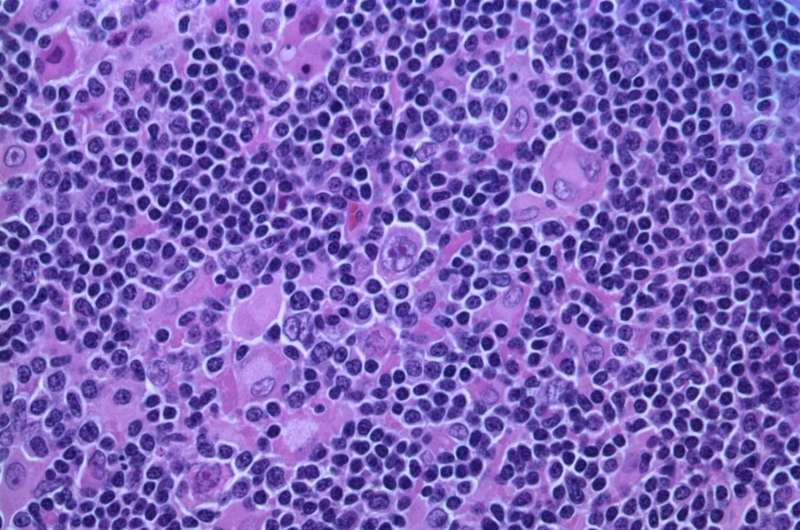Engineered cell therapy rejected for aggressive adult lymphoma on NHS in England

A cancer immunotherapy has been provisionally rejected as a treatment for some adults with an aggressive type of non-Hodgkin lymphoma on the NHS in England.
The decision will be reviewed by the National Institute for Health and Care Excellence (NICE) at the end of October.
Tisagenlecleucel (Kymriah) is one of a new line of immune-boosting treatments called CAR T cell therapies, which involve taking a patient's own immune cells and modifying them in the lab. When the engineered cells are given back to the patient, they're primed to recognise and attack cancer cells.
Kymriah has been trialled for patients with an aggressive type of non-Hodgkin lymphoma (diffuse large B cell lymphoma) who have already had two or more different types of treatment.
Unpublished clinical trial results showed that 5 in 10 patients responded to the treatment, with the disease completely disappearing in half of these cases 3 months after treatment. But these potent immune-boosting treatments can trigger severe side effects, including severe neurological problems and serious infections. The trial involved 93 people.
The recommendation comes a fortnight after NHS England announced Kymriah would be offered to some children and young adults with acute lymphoblastic leukaemia on the NHS in England. Exact details of that recommendation are yet to be published, but NHS England said the treatment would be paid for by the Cancer Drugs Fund for the small number of children who may benefit.
Emlyn Samuel, Cancer Research UK's head of policy development, called the decision not to also recommend Kymriah for adults with aggressive lymphoma "disappointing."
Long-term data needed
The committee said that although the clinical trial results suggest a good number of patients respond to Kymriah, there's no direct data to compare it with standard chemotherapy treatment. This means that the benefits of Kymriah compared with standard treatment are unknown.
NICE said the lack of long-term data to demonstrate Kymriah's effectiveness, combined with the treatment's high price, meant it couldn't be considered cost-effective on the NHS.
"We face an uncertain time regarding access to CAR T cell therapies for patients with diffuse large B cell lymphoma," said Professor Karl Peggs, a Cancer Research UK-funded immunotherapy expert. "The early results are exciting but remain relatively limited, making it difficult to assess the true benefits of these therapies over existing treatments."
Meindert Boysen, director of the Centre for Health Technology Evaluation at NICE, said: "We have seen promising results for CAR-T therapies in early trials and believe there is great potential for tisagenlecleucel-T to help people who have not responded to other forms of therapy.
"Although we could not recommend tisagenlecleucel-T for adults with lymphoma, we welcome further discussions around the cost-effectiveness of the treatment and engagement with stakeholders."
The treatment's manufacturer, Novartis, can now submit additional data, which will be reviewed by NICE before a final decision is reached. And there will be more negotiations between the company and NICE about the price of the treatment.
In August another CAR T cell therapy, called axicabtagene ciloleucel (Yescarta), was also provisionally rejected as a treatment for aggressive non-Hodgkin lymphoma on the NHS in England. This decision will be reviewed at the end of September.
Samuel said that although CAR T cell therapies have shown great promise in some lymphoma patients, the process of manufacturing the drug is complex and very expensive.
"We urge NICE, NHS England and the manufacturer to work together so that the best possible evidence on the drug's effectiveness is available when this decision is reviewed next month, and to agree a deal to ensure affordable access for patients as soon as possible," he said.
Peggs said that, in meantime, there are a number of ongoing clinical trials that will help to bridge the gap.



















